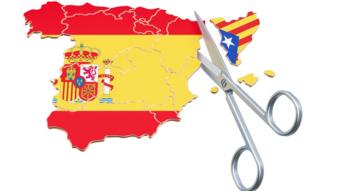
The economy plays a key role in the Catalan independence process.
The numbers are one of the main arguments that wields the sovereignist sector in defending secession. Especially those who show that their region contributes to the Spanish coffers more than it receives in return.
Opponents of independence also turn-and today more than ever to try to contain figures for the sovereignist longing.
The result is that both sides accuse each other of manipulating data and paint unrealistic scenarios.
According to whom the case is made, Catalonia will be a prosperous country and Spain failed or be damaged by secession.
But, as explained by the president of the Institute of Economic Studies (IEE), José Luis Feito, when two parts forming a single entity are separated, it is inevitable that both lose something .
LOSING THE CATALAN
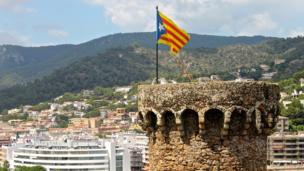
1. Membership of the European Union
The vast majority of studies on what impact would independence in the Catalan economy are based a Catalonia that remains in the European Union (EU).
Or, at least, in the European Economic Area, which gives access to the single market without belonging to the supranational bloc.
However, the EU has warned on many occasions that it will not happen : if Catalonia becomes a new state must apply for admission to the institution and meet the stringent conditions that this requires. A process that takes years.
The Catalan government believes that this is a speech that, in practice, the EU will apply. Although I do not set a precedent that other regions with similar claims to Catalan, as the German Bavaria or Lombardy italiana- could try to exploit.
Leaving the EU would be one of the biggest losses for Catalonia, because it would no longer have access to a market in which people and goods can move freely without visas or customs fees.
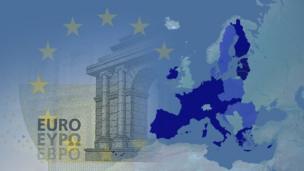
Companies and universities could not participate in European research programs, which are an important source of funding for many scientists.
For example, Catalonia has assigned s 1,521 million euros (US $ 1,784 million) in aid from the Structural Funds and Investment for the period 2014-2020, according to EU data.
2. Eurozone
The Catalan Generalitat -the executive says that Catalonia will not fail to use the euro even if it is outside the eurozone.
As does Ecuador with the dollar US , the Catalan government declared legal tender to provide "legal certainty to business transactions of their companies."
And stipulated the reports prepared by the Advisory Council for the National Transition (CATN), the agency that created the Generalitat to study and design the way to the founding of a new state.
Feito, however, consider this "impossible".
President of the IEE, which is based in Madrid, predicted that an independent Catalonia would be born with a leak of companies and capital would not allow him to cope with payments such as salaries of its officials "and the first 100 days."
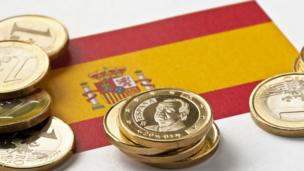
"Nobody would lend him the Catalan State euros, so I would have to print its own currency and this would be brutally inflation," he told BBC World.
"Not being a member of the Eurozone debt could not be used as collateral to ask the European Bank funding," he said.
The economist believes that the market "is not going to give choice" to the Generalitat and that this "will put a corralito for the euro do not go and even Catalan separatists try to take their money from the banks."
Use a foreign currency means not being able to influence exchange rates nor interest . You can also exports more expensive, reducing competitiveness.
3. The European Central Bank
To remain outside the eurozone, Catalonia would lose the safety net representing the European Central Bank (ECB) , which during the crisis rescued several Spanish institutions.
Shortly after Puigdemont announced that declare independence unilaterally, two of the largest Catalan banks, Banco Sabadell and CaixaBank, decided Eron move its headquarters to other regions of Spain .
While this action has no effect level of taxes and involves the transfer of employees, he braked a little drop in the stock market suffering coming after the referendum.
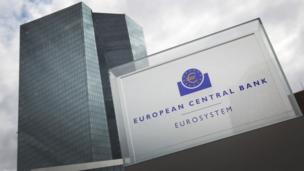
It also served to assure customers that would be under the umbrella of the ECB and in the future the eurozone banking union is launching.
The CATN hopes that the EU will act to avoid a " scenario of catastrophic type " as he described Feito because these "damages would affect citizens and businesses that are already full members of the EU ".
"In any case," according to this entity, it will be damage "would only occur most likely in the short term."
4. The economy
According to the Catalan government, the region contributes to the Spanish coffers more than it receives in return. Specifically, 16,000 million euros (about US $ 18,766 million), representing 8% of GDP .
"This does not mean that Catalonia will win immediately 16.000 million euros , "noted Professor of the Masters in Taxation UPF Barcelona School of Management, Albert Sagués.
There are expenses that currently assumes Spain , as the army, social security and pensions. According to calculations by Sagués, once discounted the Generalitat you would leave a surplus of 8,000 million euros .
The central government admits that Catalonia has a negative fiscal balance, but stands at 5.02% of GDP instead of 8%, according to the Ministry of Finance. That is, about 9,900 million euros (about US $ 11,500).
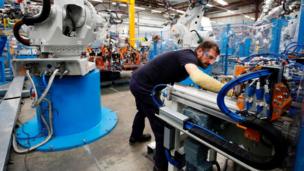 AFP
AFP
In a document published three years ago by the Ministry of Foreign Affairs, to "different studies mainly conducted by investment banks", including one bank JP Morgan, which concluded alluded that if Catalonia he took over from Spain with these expenses would have to devote 5.8% of its GDP .
That is, it would have a deficit of 0.78% .
This, under the assumption that Catalonia after independence maintained a GDP of around 200,000 million euros (about US $ 234,000 million), as the current.
But according Feito, a unilateral declaration of independence would create a "massive decline in activity" that would produce a "collapse" of the economy which, in turn, would lead to a destruction of jobs .
According to the Spanish Economy Minister, Luis de Guindos, the Catalan GDP would fall by between 25% and 30% in case of secession. Credit Suisse puts this reduction in at least 20%, the statement of Foreign Affairs.
Sagués, however, believes that "may have a negative impact in the short term" but that "worst case scenario" the economy of the new state will not come to decrease by more than 4% .
 GETTY IMAGES
GETTY IMAGES
"In World War II, the country lost 25% of its GDP. We are talking about a war situation in which millions of people die," he told BBC World Professor.
"If someone comes up to say that the Catalan GDP will fall by 30%, which is saying is that what will happen to Catalonia is worse than a world war . I do not think that's the case , " he added .
5. Boycotts and drain companies
Reports, including those of the Generalitat, assume that the production of the new country will suffer a boycott by Spain.
The reason is that there is already a precedent.
In 2004, the leader of a pro- independence party made statements against Madrid's bid for the Olympics in 2012. This sparked the rest of Spain , a boycott cava industry , a typical sparkling wine from Catalonia.
Precisely a brand in this sector, Freixenet, announced Friday that it was studying move its headquarters outside Catalonia.
At least seven large companies have already done so, including one of the country's largest energy: Gas Natural Fenosa, which said it is a "temporary" measure.
"If you really go to a unilateral declaration of independence, there will be a significant outflow of companies , which will cause serious damage to Catalonia , " he said on national radio Freixenet's president, José Luis Bonet.

"Independence is no joke," said the also president of the Chamber of Commerce of Spain. "It really is a nonsense".
"80% of companies are multinational and very few would. If they are there is now because Catalonia is within Europe . Otherwise, they would have to pay tariffs , " said Feito.
One out of three export firms in Spain is based in this region, which accounts for 25% of the country 's exports , according to the Ministry of Economy.
According to the same entity, Spain buys 40% of the products coming out of Catalonia and another 40% goes to the rest of the EU. In addition, 14.3% of tourists visiting the region are from the rest of Spain.
Still, the CATN believes that a boycott would only cause a fall in GDP that "hardly exceed 2%".
The agency alleges that the Catalan products are manufactured with "intermediate products imported from the rest of Spain", so a boycott would also affect this country . In any case, it considers that its surplus would allow "amply" offset this decline.
LOSING THE SPAIN
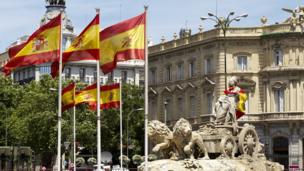
1. His most prosperous region
After a severe crisis that lasted nearly a decade, Spain has still not fully recovered.
About four million people are unemployed and more than half of it looking for at least one year , according to data from the National Statistics Institute (INE).
If the Catalans is discounted, the number of unemployed Spaniards would still be high: 3416900 people.
A situation that would worsen if the country loses its richest region .
Catalonia last year recorded a record GDP: 223,629 million euros (about US $ 261,500 million). A figure above Ecuador's economy and double that of Panama.
Independence would cost Spain then say goodbye to 19% of GDP and 18.4% of their companies .
The result would be a "poorest state , " he admitted the president of the IEE. The GDP per capita fall about $ 1,000 to 23,250 euros (about $ 27,219), as calculated by Sagués.
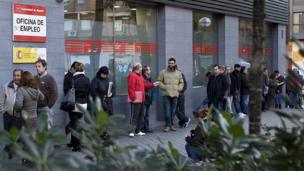
Catalonia contributes some 70,300 million euros (about US $ 82,300) to the Spanish coffers, rather than the other regions, according to the Ministry of Finance most recent (2014).
Of these, the central government gets about US $ 11,500 that used to help poorer areas such as Extremadura or the cities of Ceuta and Melilla. "In other words, Spain does business , " said Sagués.
The International Monetary Fund (IMF) on Friday expressed concern about the situation. While it considered that "the current outlook for Spain are positive , " he said that if extend "political tensions in Catalonia could lastrar confidence in investment and consumption ."
2. Innovation and Entrepreneurship
Catalonia is a region that has invested heavily in R & D and has developed pioneering industries in Spain.
Of the 108,963 scientific publications produced by Spanish universities between 2006 and 2015, 25.68% came from Catalonia . Followed by Madrid, with nearly six percentage points (19.91%), according to data from the Alliance 4 Universities.
Barcelona also ranks fifth in Europe in terms of start ups , one position ahead of the Spanish capital.
Last year, companies in this Catalan tcapital captured 282 million euros (about US $ 330 million), which accounted for 56% of total investments in Spain .
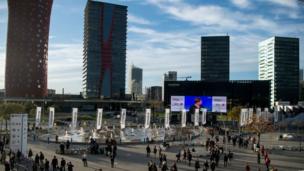 AFP
AFP
The region also leads the patent claims in the country; in 2016, 35.1% of the 547 that were requested in Spain were recorded there, according to the latest report by the European Patent Office. Well ahead of the 20.6% of Madrid, which ranked second.
3. Infrastructure
With the departure of Catalonia, Spain would lose the most important Mediterranean port : the port of Barcelona.
With 22 kilometers of piers and moorings in 2016 had a traffic exceeding 48 million tons.
The port is also key for tourism: almost four million passengers passed through there last year. In addition, cruise ships like the Harmony of the Seas, the largest in the world, they have base.
Another important port in Catalonia is Tarragona, which houses the largest network of chemical industry of the country .
In Catalonia, they operate several airports, including El Prat, rivaling in number of passengers with Adolfo Suárez-Barajas, in Madrid. Last year lived the best ever, with 44.1 million passengers .
The region is also home to two of the six nuclear plants that exist in Spain and which produce 40% of its nuclear energy .
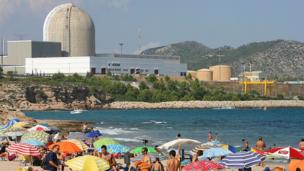 AFP
AFP
Add to that an extensive rail network that connects the Spanish Mediterranean cities with the French and Italian adds.
4. External debt and active
One of the thorniest issues is the foreign debt that would have the new Catalan state.
CATN reports say that Catalonia should assume the debt that is the name of the Generalitat, provincial and municipal governments .
This amounts to about US $ 90,000 million, equivalent to 35.4% of GDP . Of these, US $ 61,000 million related to commitments with the government of Spain.
But the debt on behalf of the Spanish State is used for expenses and investments for the benefit of all regions, including Catalonia, so many insist that this should be responsible for their share.
The former director of the Barcelona Stock Exchange, José Luis Oller, amounted to 180,000 million euros the weight of the Catalan economy in the debt of all Spain during a debate held two years ago at the College of Economists in Barcelona, as published then the daily El País .
He also noted that he had to add the value of the assets that the state had in Catalonia, it estimated at 50,000 million euros (about US $ 58,000 million ).
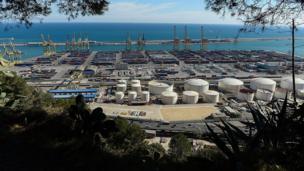 AFP
AFP
The total debt of an independent Catalonia, according to his calculations at that time was about 290,000 million euros (about US $ 340,242 million) or 145% of GDP .
The CATN denies that Catalonia must accept the debts incurred for investments and works outside this region.
However, advisable to negotiate that debt that can not be attributed to a specific territory , provided that the Spanish State transfer to the new country of the assets that were bought with that money.
For example, if Spain borrowed to create a public company that operates nationwide, Catalonia will assume part of the debt provided they receive the corresponding shares of this company.
As the possibilities of negotiation appear to be few at this time, in case of secession, most likely Spain have to pay only the total debts while invalidates conflict with the new country in international courts, explained Feito .
Catalonia also believes that Spain should repartirle "fairly" public goods that are outside the country and embassies offices, oil platforms, military bases, current accounts in foreign banks and space satellites, according to CATN.
5. Cultural Heritage and Tourism
Spain is a tourist power and last year broke records with 75.3 million foreign visitors , almost 10% more than in 2015.
But almost a quarter (22.5%) is destined for Catalonia , which in 2016 received 17 million foreign travelers. About four million less than the region occupied the second position: the Balearic Islands.
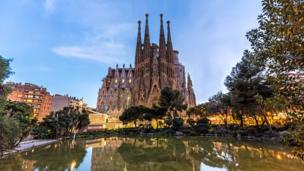
Its 580 kilometers of coastline offer paradisiacal beaches that are easily accessible by train or bus. In winter, the mountains in the Pyrenees are among the favorite of skiers.
But the region also has an important cultural richness thanks to its World Heritage Sites like the works of architect Antonio Gaudí who are scattered all over Barcelona. Among them are the Park Guell, the Sagrada Familia and Casa Mila.
Not only do these fall outside of Spain, but the Government may also demand the return of the archives, cultural heritage and national heritage referring to Catalonia or whose author was Catalan , according to CATN.
This would mean that works of authors like Salvador Dalí or Joan Miró that today are preserved as museums in Madrid Reina Sofía should be given to the new state.


No hay comentarios:
Publicar un comentario
No se admiten comentarios con datos personales como teléfonos, direcciones o publicidad encubierta